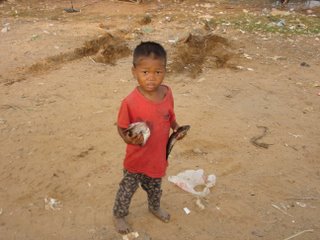
There are those who have and those who have not. It is this very issue that brings me to write about an event that in itself is horrific, but in general is reality and worthy of sharing, if for no other reason, than to make us all aware of what we have or have not.
It is common practice in Cambodia for three to five people to ride on a small motorbike to get around. Usually it is a family, the father driving, a small one or two year old on his lap holding on to the handlebars, a toddler right behind him, and the mother on the back riding side saddle. This event involves the toddler who for whatever reason, fell off the bike, and in landing in the street proceeded to break both of her forearms and wrists in 3 or 4 places. A missionary happened to be in a truck directly behind the accident, and stopped. He picked up the child, put her and the family in the truck, and drove them to the local hospital. He dropped them off for medical care and left. The next day he returned to see how the little girl was doing only to find the mother wailing in the street, clutching her one year old, and the father catatonic. The missionary asked where the little girl was, and was led to a cot. There lay the little girl with both her arms amputated at the elbows. He was speechless. When he could talk, he grabbed the physician and demanded to know what happened. The answer was simple: the family had no money, and without money, there would be no surgery to place pins, screws, and plates to fix the fractures. There would be no casts, and no follow up care. No money, no medical care. It was decided that the best thing to do would be to amputate the forearms, as the surgery for that was quick, and the care needed afterwards was minimal. And that was that. No consent, no discussion, no remorse. It is this very event that was shared with me that made me realize that in fact we are those who have.
What we have here are conflicting values. Here was a physician who is supposed to act as an agent of good, but does evil. But in his defense, could he have done anything else? The culture, the environment, the demands, and the expectations would not allow him. Trying to do good things for people can be very hard indeed. Look at our own environment and culture: managed care regulating what we can do and those who are without health insurance demanding care and procedures that are beyond the reasonable. We work in a medically privileged society, primarily because we have. That family in Cambodia had not, and they paid dearly for it.
I don’t try to explain these kinds of events because they can’t be explained. Some things in life just happen, and maybe they have a reason, and maybe they don’t. In either case, the best we can do is to remember and learn from the moment. I studied medical ethics under Dr. Pellegrino at Georgetown, and remember the words he ingrained in me daily: “health care is not a commodity but a human good.” That simple statement continues to give me reason to keep on caring for children who are ill and injured through no fault of their own. Look around at our own lives and be thankful for what we have, and ever mindful of those who have not. That might not be enough for everybody, but it’s enough for me.
In all things, give thanks…
David
copyright 2006
